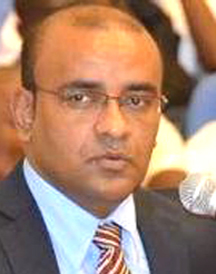Former President Bharrat Jagdeo recently joined world leaders in appealing for urgent global action on climate change and announced a new partnership with Colombia and three European governments “to provide performance-based payments across Colombia’s Amazon region.”
Jagdeo met with UN Secretary-General Ban Ki-moon and other world leaders at a UN Framework Convention on Climate Change (UNFCCC) meeting held last week in Warsaw, Poland following a Commonwealth Heads of Government Meeting in Colombo, Sri Lanka last week.
The former president met with the Secretary-General to “specifically focus on the needs of the smallest and most vulnerable states, including those in the Alliance of Small Island States (AOSIS),” a press release said. He also supported the Republic of Nauru in the South Pacific, which currently holds the chairmanship of AOSIS, in its submissions with the Secretary-General about the threats to its members. Jagdeo also briefed the Secretary-General on the discussions about climate finance that took place among Commonwealth Heads of Government, which specifically addressed the report of the Commonwealth Expert Group on Climate Finance, which the former president chaired.

Speaking after the meeting, Jagdeo reiterated that there was need for engagement by heads of government if climate change is to be addressed, a point he also made at the just-concluded Commonwealth meeting before travelling to Poland.
“The world has committed to finalising a legally binding climate agreement by 2015 − that is now just two years away. If we are to have a chance of averting catastrophic climate change, climate change has to become a Heads of Government issue between now and then,” he said, while emphasising that it was imperative that the international community could do more from now until 2015 to make a practical difference for the world’s most vulnerable countries.
“In my engagements with the leaders of AOSIS, they emphasised their practical needs today – not in 2015. There is a lot the world can do to help the world’s most vulnerable countries. Negotiations for a post-2015 agreement are an important part of that. But so are practical interventions today, to help build hurricane-proof hospitals and schools; to make agriculture and other economic activities more resilient to climate events; to create new financial mechanisms that make clean energy more attractive,” he said.
Forests partnership
Similar to his advocacy for the more vulnerable countries, Jagdeo continued to draw attention to the important role forests can play in future climate solutions. On several previous occasions, he had emphasised the power of partnerships between developed countries and forest countries on deforestation. In keeping with this, Jagdeo along with the governments of Colombia, Norway, the UK and Germany announced that they would be collaborating on an ambitious partnership to provide performance-based payments across Colombia’s Amazon region. This partnership − potentially covering 40 million hectares of the Amazon − will join with Brazil’s Amazon Fund and Guyana’s national forest mechanism to significantly expand the proportion of the Amazon that is generating payments for climate services.
At the same meeting, the US, UK, German and Norwegian governments pledged US$280 million to a new World Bank Bio-Carbon Fund to support more sustainable agriculture in countries like Colombia and Indonesia. Jagdeo praised both Colombia’s vision and the new donor programme, and highlighted the importance of continuing to spread the good examples of partnership that are starting to emerge.
On Thursday night, Jagdeo attended a high-level event hosted by the Indonesian government; whose US$1 billion forest programme is one of the three largest in the world (the other two being in Brazil and Guyana). Jagdeo spoke again of the importance of leadership from forested countries such as Indonesia. He also said that Guyana was starting to reap the benefits from several years of hard work as funds from the Guyana-Norway partnership start to flow into Guyana’s Low Carbon Development Strategy.
However, he noted that partnerships should not be limited to countries like Indonesia, Guyana, Brazil and Colombia, but should include countries in Africa which were left out. Jagdeo also reiterated the importance of a functional REDD+ mechanism in a global climate agreement, noting that negotiations to achieve this were ongoing in Warsaw and must be completed there.





